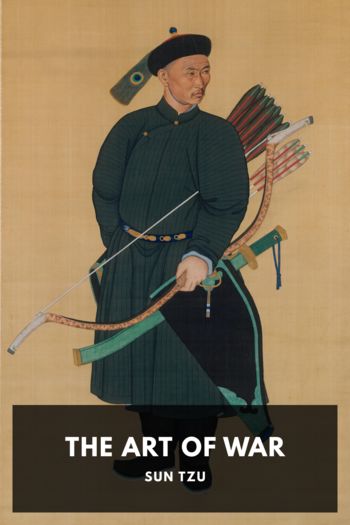Tao Te Ching, Laozi [the gingerbread man read aloud TXT] 📗

- Author: Laozi
Book online «Tao Te Ching, Laozi [the gingerbread man read aloud TXT] 📗». Author Laozi
Laozi describes some other and kindred results of cultivating the Tao in terms which are sufficiently startling, and which it is difficult to accept. In his fiftieth chapter he says, “He who is skilful in managing his life travels on land without having to shun rhinoceros or tiger, and enter a host without having avoid buff coat or sharp weapon. The rhinoceros finds no place in him into which to thrust its horn, nor the tiger a place in which to fix its claws, nor the weapon a place to admit its point. And for what reason? Because there is in him no place of death.” To the same effect he says in his fifty-fifth chapter, “He who has in himself abundantly the attributes (of the Tao) is like an infant. Poisonous insects will not sting him; fierce beasts will not seize him; birds of prey will not strike him.”
Such assertions startle us by their contrariety to our observation and experience, but so does most of the teaching of Taoism. What can seem more absurd than the declaration that “the Tao does nothing, and so there is nothing that it does not do?” And yet this is one of the fundamental axioms of the system. The thirty-seventh chapter, which enunciates it, goes on to say, “If princes and kings were able to maintain (the Tao), all things would of themselves be transformed by them.” This principle, if we can call it so, is generalised in the fortieth, one of the shortest chapters, and partly in rhyme:—
“The movement of the Tao
By contraries proceeds;
And weakness marks the course
Of Tao’s mighty deeds
All things under heaven sprang from it as existing (and named); that existence sprang from it as nonexistent (and not named).”
Ho-shang Kung, or whoever gave their names to the chapters of the Tao Te Ching, styles this fortieth chapter “Dispensing with the use (of means).” If the wish to use means arise in the mind, the nature of the Tao as “the nameless simplicity” has been vitiated; and this nature is celebrated in lines like those just quoted:—
“Simplicity without a name
Is free from all external aim.
With no desire, at rest and still,
All things go right, as of their will.”
I do not cull any passages from Chuang-tzŭ to illustrate these points. In his eleventh book his subject is government by “Let-a-be and the exercise of forbearance.”
This Tao ruled men at first, and then the world was in a paradisiacal state. Neither of our authorities tells us how long this condition lasted, but as Lao observes in his eighteenth chapter, “the Tao ceased to be observed.” Chuang-tzŭ, however, gives us more than one description of what he considered the paradisiacal state was. He calls it “the age of perfect virtue.” In the thirteenth paragraph of his twelfth book he says, “In this age, they attached no value to wisdom, nor employed men of ability. Superiors were (but) as the higher branches of a tree; and the people were like the deer of the wild. They were upright and correct, without knowing that to be so was righteousness; they loved one another, without knowing that to do so was benevolence; they were honest and leal-hearted, without knowing that it was loyalty; they fulfilled their engagements, without knowing that to do so was good faith; in their movements they employed the services of one another, without thinking that they were conferring or receiving any gift. Therefore their actions left no trace, and there was no record of their affairs.”
Again, in the fourth paragraph of his tenth book, addressing an imaginary interlocutor, he says, “Are you, Sir, unacquainted with the age of perfect virtue?” He then gives the names of twelve sovereigns who ruled in it, of the greater number of whom we have no other means of knowing anything, and goes on:—“In their times the people used knotted cords in carrying on their business. They thought their (simple) food pleasant, and their





Comments (0)